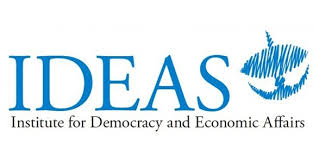KUALA LUMPUR: In the wake of the revelation on RM47 billion loss in Gross Domestic Product (GDP) value last year due to corruption, Institute of Democracy and Economic Affairs (IDEAS) said it must be viewed as a systemic problem and should be addressed through education and less dependence on government contracts and projects.
IDEAS Coordinator for Democracy and Governance Aira Nur Ariana Azhari said the culture of political patronage, cronyism and rent-seeking that came from opaque tendering processes and the absence of political financing regulations affected even people at the lowest levels of society.
“The entire ecosystem of transparency and accountability needs to be revamped from the ground up. The people need to understand that giving and receiving bribes in return of favours and positions is unacceptable,” she told Bernama in an email interview.
Aira was commenting on the statement made by Deputy Prime Minister (DPM) Datuk Seri Wan Azizah Wan Ismail earlier today on the RM47 billion loss.
Quoting Transparency International Malaysia, the DPM said a similar amount – about 4.0% of GDP – was lost to corruption annually since 2013.
Dr Wan Azizah, who is also Women, Family and Community Development Minister, said the government changed overnight last May but it would take much longer to address the corruption that had become endemic in various institutions.
Aira said it was generally difficult to measure the severity of corruption in any country.
She pointed out that one of the indicators that Malaysia frequently used was the Corruption Perception Index, in which the country’s ranking fell seven places to 62 in 2017 from 55 in 2016.
“As the DPM rightly said, RM47 billion is a huge amount that has been lost through corruption which should be channelled towards services such as education, health and transportation. Investor’s confidence will also be affected by high levels of corruption, which in turn will hurt the economy,” said Aira.
At the policy level, she noted that laws on asset declaration, freedom of information and political financing needed to be enacted as soon as possible.
“Finance Minister Lim Guan Eng announced that a Government Procurement Act will be enacted next year, which is positive in ensuring competitive bidding processes that will result in best value for taxpayers’ money,” added Aira.
Meanwhile, Sunway University Business School Professor of Economic Dr Yeah Kim Leng said the political will to expose and prosecute the various financial scandals had sent the right message to all politicians, civil servants and the public that corruption and bribery in any form would not be tolerated by the new government.
He added that the strict enforcement of the law against corruption and relentless prosecution was foremost among the steps needed to stamp out corruption.
“The accompanying institutional reforms such as empowering an independent Malaysian Anti-Corruption Commission, commitment to open tender, asset declaration by ministers, and emphasis on integrity, are among the necessary measures taken to foster a graft-free and efficient government,” said Yeah.
He also called for the universal values of trust, integrity and honesty to be instilled not only in the education system but also in the selection and promotion of ministers and government officials.
“Likewise, as it takes two hands to clap, similar values, ethics and code of conduct will need to be inculcated in the private sector,” added Yeah. — Bernama













